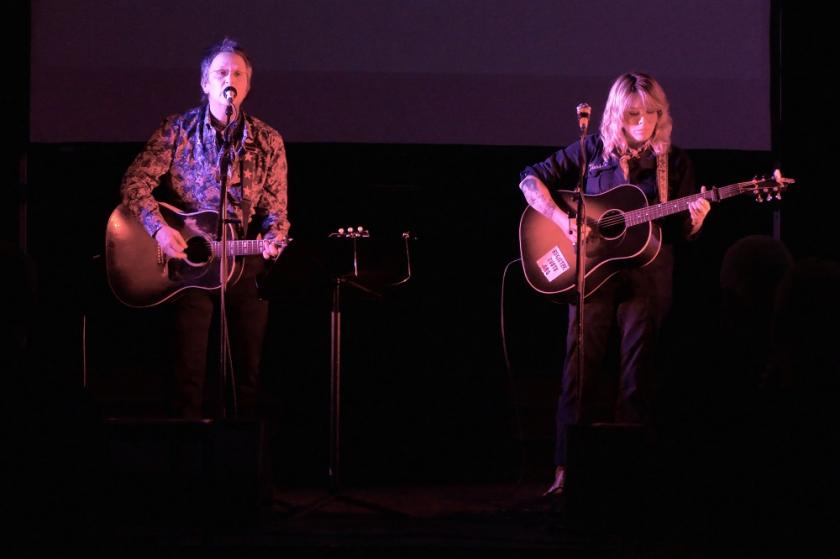Mary Gauthier’s first tour in more than three years landed at London’s Union Chapel on Saturday, concluding with another sold-out gig. The venue is perfect for unplugged acts – intimate, architecturally pleasing and acoustically spot on. But cold, on this windswept November night.
The vibe, however, was warm and cosy. Jaimee Harris – Gauthier’s partner in life and music – opened with a half-hour set that set the tone for the evening. Relaxed, chatty – a living room concert in all but location – Harris was joined on fiddle by Michele Gazich (pictured below, far left), whose work with Gauthier includes her most recent album and the lockdown series of Sundays with Mary. Her engaging set included “Love is Gonna Come Again”, “Missing Someone” and “Boomerang Town”. The title track from her forthcoming album, the latter was inspired by a visit to the Guthrie Center in Tulsa, Oklahoma, where Harris saw all Woody’s handwritten lyrics to “This Land is Your Land”. The verse about “the steeple” and “the relief office” – usually omitted, but sung on the steps of the Lincoln Memorial on the eve of the Obama inauguration – struck a chord, reminding her of her hometown of Waco, the boomerang town of the title. Displaying a real reverence for Americana history, she chatted not only about Guthrie but also Bob Neuwirth before offering a beautiful rendition of “Beyond the Blues”, the song he co-wrote with Peter Case and Tom Russell.
Harris, whose credits as a backing vocalist include Gauthier’s latest album Dark Enough to See the Stars, seems destined for country music stardom, her emotive voice conventionally beautiful in a way that Gauthier’s is not. Gauthier’s voice is direct and confessional; plain, cracked and comforting – the sound of an old friend reaching out through the darkness. Sort of a female Kris Kristofferson or the late John Prine, who was one of her mentors. And that’s of course what makes it so appealing – it speaks volumes, drawing you into songs that dig deep into personal experience, into the pain and anguish of so many lives. “Lots of people don’t like it when I write a happy song”, Gauthier joked, having sung “Thank God for You”.
Country music has long grappled with difficult subjects, traditionally poverty, drink, and philandering husbands, but Gauthier has consistently pushed the boundaries, mining (of course) her own difficult life as a gay adoptee who sought solace wherever she could and who drank herself unconscious by the age of 12 and spent her 18th birthday in jail. She was clean and dry by her mid-twenties, but she probably has more raw material to draw on than most women in country music and it’s made her more than usually empathetic. She’s worked with veterans and, following the pandemic, medics and first responders dealing with the trauma of Covid’s front line. “Songs are what feelings sound like” believes Gauthier. Music in its highest form, is empathy.
 With Harris adding lead guitar and vocals, and Gazich alternating between violin and piano, Gauthier opened with “I Drink”, a signature song that embraces both her own experience and her adoptive father’s. She ranged widely across her repertoire – “Last of the Hobo Kings”; “Bullet Holes in the Sky” and “War After the War”, both from the decade-long veterans project; “Amsterdam”, written during a Covid-enforced stay in the city with Harris; “Movin’ On”; and “How Could You Be Gone?”, co-written with Harris (who took the lead) as they tried to come to terms with the loss of so many friends.
With Harris adding lead guitar and vocals, and Gazich alternating between violin and piano, Gauthier opened with “I Drink”, a signature song that embraces both her own experience and her adoptive father’s. She ranged widely across her repertoire – “Last of the Hobo Kings”; “Bullet Holes in the Sky” and “War After the War”, both from the decade-long veterans project; “Amsterdam”, written during a Covid-enforced stay in the city with Harris; “Movin’ On”; and “How Could You Be Gone?”, co-written with Harris (who took the lead) as they tried to come to terms with the loss of so many friends.
In between she chatted, read passages from her book, Saved By a Song, and talked about her life in Nashville, to which city she relocated, aged 40, to become a songwriter. Sitting in a songwriters’ circle with Prine, Steve Earle and Guy Clark, Gauthier was invited by Nanci Griffith to sing. After she’d done so, Griffith insisted she keep the Taylor signature guitar she had lent her. The rest, as they say, is history.
Graciously thanking everyone for buying a ticket in “these difficult economic times”, Gauthier closed with “Till I See You Again”, co-written with Ben Glover for John Prine, and “Mercy Now”. She spoke approvingly of Boy George’s version – though not of his jungle sojourn.















Add comment